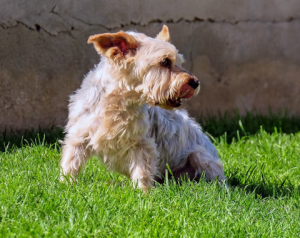Could he have a prostate problem?
There are a number of possible reasons older dogs can struggle to pass faeces, but yes, a prostate problem is quite possible, especially if he’s entire (not been neutered). 
So, what could be causing it?
Firstly, I’m afraid, we need to define what “it” is! Is he passing normal faeces, and just taking longer about it? Are his faeces really hard and dry, or an unusual shape? Does it seem to be painful for him, and if so, is there blood in the poo? These questions will really help to work out what’s going on – but any problem going to the toilet needs checking by your vet, as some of these conditions need professional attention.
Constipation is a fairly common problem in dogs – it is usually due to diet – especially eating things they shouldn’t! Foreign materials, such as cloth or soil, may ball up in the lower intestine (assuming they don’t cause a blockage further up); and chewed up bone can form a “faecolith” – a solid “rock” of bone powder, preventing normal pooing. Other problems may be too little (or even too much!) fibre in the diet. Lack of exercise is also a possible cause – many dogs can’t move their bowels effectively without exercise. If your dog isn’t getting out for a walk and/or a run regularly, some degree of constipation is often the result.
Constipated dogs strain to pass faeces, and what does come out is often dry and hard.
Obstipation is much more serious, and it’s where constipation goes untreated. The colon becomes completely jammed with material and unable to function. Often, this results in vomiting as well as constipation as food in the gut becomes “backed up”.
Nerve damage can lead to difficulty pooing, but it’s uncommon. Obviously, if you suspect your dog has a spinal problem, contact us as soon as possible!
Arthritis is another cause of these symptoms in dogs, and one most people don’t even think about. Dogs can’t go to the toilet normally unless they can squat; if their joints are stiff and sore, they may struggle to go normally.
Prostate disease is very common in older entire male dogs (obviously, bitches are immune…). The most common problem is benign prostatic hyperplasia (or BPH) – a simple enlarged prostate gland, caused by the action of testosterone. As the gland enlarges, it pushes on the rectum, making it harder for the dog to push faeces out; this often has the effect of producing “ribbons” of poo, which are flattened by the obstruction. BPH cannot happen in a neutered dog – no testicles = no testosterone, so the prostate shrinks and becomes inactive.
Other problems that some dogs may suffer from are prostatitis – this is an infection of the prostate, and often results in painful defecation, and sometimes difficulty urinating. It also tends to result in blood or even pus in the urine and semen; and if the dog is standing at stud, you may notice he seems to lose his sex drive because ejaculation is so painful.
Occasionally, dogs may suffer from prostatic tumours, although they’re pretty rare.
So what can be done?
Well, first of all you need to know what the problem is! That means you need to bring him in so one of our vets can check him over.
Simple constipation can often be resolved with a mild laxative and a change in diet. If the cause is lack of exercise, treatment is easy enough – get him out more!
Obstipation, on the other hand, needs more aggressive treatment, with laxatives and an enema under sedation or anaesthesia (essentially, we wash out the rectum and colon, usually with soapy water).
Spinal lesions need more aggressive treatment, usually in a specialist referral centre.
If your dog is arthritic, sadly, it cannot be cured; however, there are supplements and medications that may slow down its progression, and modern painkillers can make him comfortable again.
Prostate problems can almost always be improved by castration – no more testicles = no more problem. If this, for whatever reason, isn’t an option, there are drugs that mimic the effects of castration, without surgery, and will likewise cure BPH. Prostatitis is almost always a result of BPH – antibiotics and occasionally surgical drainage of the prostate are needed to treat the infection, but without castration (surgical or chemical) it’ll keep coming back. Sadly, there are very few effective treatments for prostate tumours, but we can usually make the patient more comfortable and manage the symptoms.
So, if your dog is constipated – get him down to us and our vets will check him over and see what we can do to fix it.
